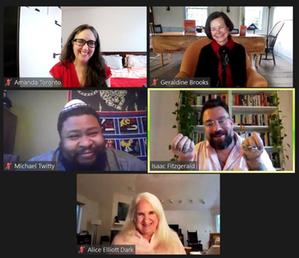
|
|
The closing event of New Voices, New Rooms, the joint NAIBA/SIBA virtual event, was the "Look Who's in Town" Author Dinner, hosted by Amanda Toronto, children's buyer and Brooklyn store manager for WORD Bookstores in Brooklyn, N.Y., and Jersey City, N.J.
Geraldine Brooks was up first, and she described her novel Horse (Viking, June 14) as a midlife gift: instead of a red convertible, hers "took the form of a black pony." Her love of horses caused her to become a tad distracted during a luncheon invitation to Plimoth Plantation, where Brooks had researched her novel Caleb's Crossing (Viking); she'd been invited on the pretext of being pitched a novel based on a woman who'd lived on the plantation, "But I'd already written that book," Brooks said, so she tuned in to different conversation. A man a few seats away was speaking of having overseen delivery of an 1850s horse skeleton from the Smithsonian in Washington, D.C., to the International Museum of the Horse in Kentucky. Brooks went home determined to learn more. What she discovered was not only the story of a magnificent racehorse and stud sire called Lexington, but also of the Black groom depicted in a painting alongside the horse, known simply as "Jarret, his groom." Brooks said, "The idea of the Black groom in the painting took hold, and I realized I couldn't leave the story of race in the past. I needed to bring it into the present."

"My parents were married when they had me, just to different people," Isaac Fitzgerald began--the opening line of his memoir, Dirtbag, Massachusetts (Bloomsbury, July 19). Fitzgerald refers to himself as a "child of passion," raised in the inner city of Boston; his parents were "unhoused," and although one tends to think of the opulence of the Catholic church, "we were more Thomas Merton, Dorothy Day." Yet the author said he was at his happiest when they were poorest. When the family moved to North Central Massachusetts, they were confronted with the leavings of the dead milling industry and a destitute population. "The most surprising thing to me," Fitzgerald said, "was that my family blew apart and then came back together. All of life is about having conversations that might one day bring about healing."
Chef and author Michael W. Twitty beautifully integrated the themes of the previous speakers, saying how moved he was by them: "A big part of this is how we tell our stories," he said. "I am touched by everyone here." Twitty spoke of the exhaustive research and interviews he did for Koshersoul: The Faith and Food Journey of an African American Jew (Amistad, August 9). "As a queer Black Jewish Southern man," Twitty said, the cover of the book was very important to him, and his husband spent 20 hours creating a gay challah, a rainbow challah, a red, green and black challah pictured on the cover. "My mother always wanted me to know, what does it mean to be a woman? She can't go anywhere without her womanhood," Twitty said, drawing a parallel to being queer, Black and Jewish, and taking who he is with him. "Food sets the table for conversation. Conversation is dialogue and also conflict," he said, adding that you can't get two Jewish people to agree on the best way to make challah bread, for instance. "But in all this disunity, there is commitment," Twitty observed. With Koshersoul, "I wanted to put ancient laws in an American context." He said, "The kitchen table is where you work out your Sturm und Drang. It's where I learned a lot about our culture, politics. The kitchen table is where you receive tradition and create new ones." --Jennifer M. Brown

